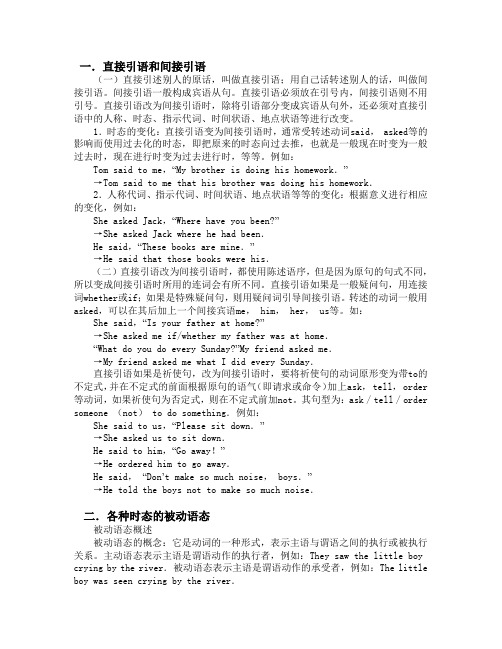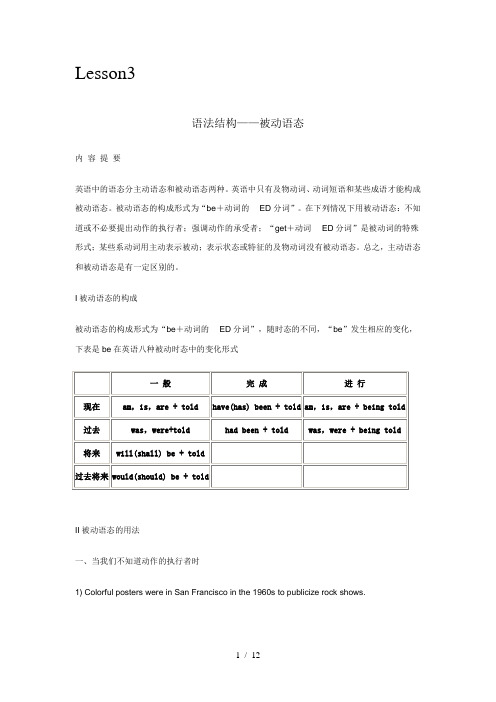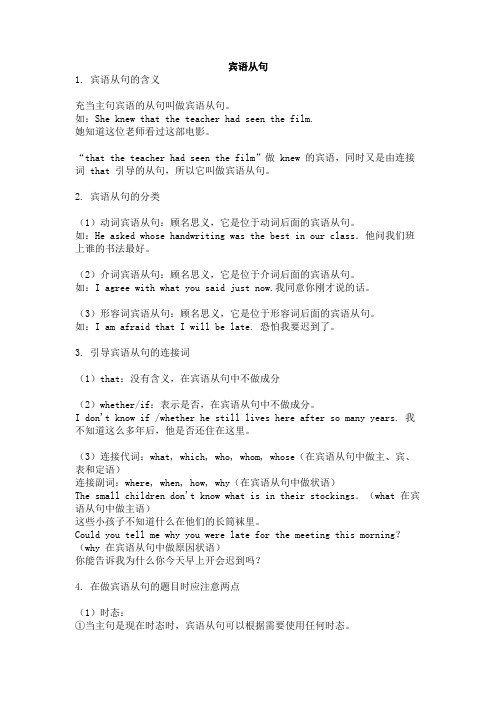被动语态定语从句
高一英语直接引语和间接引语,被动语态,虚拟语气,定语从句语法知识总结和练习

一.直接引语和间接引语(一)直接引述别人的原话,叫做直接引语;用自己话转述别人的话,叫做间接引语。
间接引语一般构成宾语从句。
直接引语必须放在引号内,间接引语则不用引号。
直接引语改为间接引语时,除将引语部分变成宾语从句外,还必须对直接引语中的人称、时态、指示代词、时间状语、地点状语等进行改变。
1.时态的变化:直接引语变为间接引语时,通常受转述动词said, asked等的影响而使用过去化的时态,即把原来的时态向过去推,也就是一般现在时变为一般过去时,现在进行时变为过去进行时,等等。
例如:Tom said to me,“My brother is doing his homework.”→Tom said to me that his brother was doing his homework.2.人称代词、指示代词、时间状语、地点状语等等的变化:根据意义进行相应的变化,例如:She asked Jack,“Where have you been?”→She asked Jack where he had been.He said,“These books are mine.”→He said that those books were his.(二)直接引语改为间接引语时,都使用陈述语序,但是因为原句的句式不同,所以变成间接引语时所用的连词会有所不同。
直接引语如果是一般疑问句,用连接词whether或if;如果是特殊疑问句,则用疑问词引导间接引语。
转述的动词一般用asked,可以在其后加上一个间接宾语me, him, her, us等。
如:She said,“Is your father at home?”→She asked me if/whether my father was at home.“What do you do every Sunday?”My friend asked me.→My friend asked me what I did every Sunday.直接引语如果是祈使句,改为间接引语时,要将祈使句的动词原形变为带to的不定式,并在不定式的前面根据原句的语气(即请求或命令)加上ask, tell, order 等动词,如果祈使句为否定式,则在不定式前加not。
英语动词被动语态题20套带答案

英语动词被动语态题20套(带答案)一、动词被动语态1.In the past, the poor man for a long time every day.A. was made to workB. was made workC. made to workD. made work【答案】A【解析】【分析】句意:过去,这个可怜的人每天都要工作很长一段时间。
考查被动语态。
由题干可知本句的主语the poor man是动作的承受者,所以应用被动语态,其结构为“be+动词过去分词〃,所以排除C、D选项;根据In the past可知时态应用一般过去时,主语为the poor man所以系动词be用was;make为使役动词,其过去分词为made,用于被动语态时后面的to不能省略,因此排除B选项;故答案选A。
【点评】考查一般过去时态中的被动,注意make sb do的被动应加上to.2.These cakes with chocolate. Have one, please.A. fillB. filledC. are filledD. were filled【答案】C【解析】【分析】句意:这些蛋糕里装满了巧克力。
请吃一个。
根据cakes与fill之间是被动关系,要有被动语态;由下句Have one, please.可知上句要用一般现在时,要用一般现在时的被动语态,am/is/are+过去分词。
主语cakes,复数,要用are, fill的过去分词filled, 故选C。
【点评】考查一般现在时的被动语态。
根据主语与谓语动词之间的关系确定语态,同时根据语境确定时态。
3.To our surprise, the walls of the new bookstore books.A. are lined withB. is lined withC. have lined with【答案】A【解析】【分析】句意:令我们惊奇的是,新书店的墙上排满了书,用……把……布满,排满:line...with...,主语the walls是谓语动词line的承受者,用被动语态;the walls是主语中心词,of the new bookstores是作定语的介词短语,主语是复数,谓语也要用复数形式。
英语语法结构——被动语态

Lesson3语法结构——被动语态内容提要英语中的语态分主动语态和被动语态两种。
英语中只有及物动词、动词短语和某些成语才能构成被动语态。
被动语态的构成形式为“be+动词的ED分词”。
在下列情况下用被动语态:不知道或不必要提出动作的执行者;强调动作的承受者;“get+动词ED分词”是被动词的特殊形式;某些系动词用主动表示被动;表示状态或特征的及物动词没有被动语态。
总之,主动语态和被动语态是有一定区别的。
I被动语态的构成被动语态的构成形式为“be+动词的ED分词”,随时态的不同,“be”发生相应的变化,下表是be在英语八种被动时态中的变化形式一般完成进行现在am,is,are + told have(has) been + told am,is,are + being told 过去was,were+told had been + told was,were + being told 将来will(shall) be + told过去将来would(should) be + toldII被动语态的用法一、当我们不知道动作的执行者时1) Colorful posters were in San Francisco in the 1960s to publicize rock shows.[A]print[B]prints[C]printed[D]printing2) The main [A]stream of a river frequently is dividing [B]into two or more [C]branches near its mouth [D] .二、当我们不必要指出动作的执行者时3) The tenor drum(小鼓) is used primarily in military bands and is normally with small felt sticks.[A]play[B]played[C]to play[D]playing4) I’ll take down your name and address in case you as a witness.[A]are needed[B]will be needed[C]need[D]will need5) Cottage cheese,an American favorite [A],can made easily [B]at home [C]from milk [D],lemon,juice,and salt.三、当我们强调或侧重动作的承受者时,这时我们通常用by引出动作的执行者6) The seating of musicians in an orchestra is arranged to produce the desired blend of sounds from the various musical sections.A the conductor ofB from the conductorC the conductor andD by the conductor7) The bridge was hitting [A]by a large ship during [B]a sudden [C]storm last [D]week.四、“get+ed分词”的被动语态,这时习惯固定用法,这种结构往往更强调动作的结果而非动作的本身8) “Your daughter has two children, doesn’t she?”“That’s right. She in 1970.”[A]did marriage[B]was married[C]had married[D]got married9) Supposing you five bottles of beer, do you think you would get drunk?[A]were drinking[B]have drunk[C]were to drink[D]drink五、主动形式表示被动意义,如某些系动词如cook, feel, prove, smell和taste等其主动语态表示被动的意义10) The patted shoes that my wife bought me comfortable.[A]felt[B]feels[C]was felt[D]is felt11) As [A]the proverb says [B], “Good medicine is tasted [C]bitter to [D]the mouth.”六、没有被动语态的词,表示状态或特征的及物动词如contain, cost, fit, have, lack, suit等没有被动形式,另外,诸如happen, occur, take place, break out 等不及物动词或短语以及诸如result from(缘于),belong to, consist of等只用主动语态,而不用被动语态12) Some critics maintain that when [A]a work of literature is lacked [B]reference to [C]the general experience of mankind,it fails as art [D] .13) The book that I bought [A]the day before [B]yesterday is costed [C]me twenty and a half yuan [D] .[注]除此之外,某些词如反身代词和相互代词以及ING和不定式不能作为被动语态的主语;某些被动语态没有相应的主动语态如“I was born in 1966.”。
被动语态、分词、双否、定语从句的作文

被动语态、分词、双否、定语从句的作文作文一《我最喜欢的动物》小朋友们,你们知道我最喜欢什么动物吗?让我来告诉你们吧,我最喜欢的动物是小兔子。
小兔子有着雪白的绒毛,摸起来软绵绵的,就像棉花糖一样。
它的眼睛红红的,像两颗闪闪发光的红宝石。
它的耳朵长长的,总是警惕地竖着,一有风吹草动,就会立刻跑开。
小兔子被很多小朋友喜欢,可不是没有原因的。
它不仅长得可爱,而且性格还很温顺。
我曾经养过一只小兔子,它总是乖乖地待在笼子里,不会乱发脾气。
每次我去喂它的时候,它都会用那双可爱的眼睛看着我,好像在说:“谢谢你,小主人。
”我真的太喜欢小兔子啦,你们喜欢吗?作文二《我的梦想》亲爱的小伙伴们,今天我想和你们聊聊我的梦想。
我的梦想是成为一名画家,用我的画笔描绘出美丽的世界。
每当我看到那些漂亮的画,我就忍不住感叹,多希望那是我画的呀!那些色彩斑斓的画,总是能吸引我的目光,让我沉浸其中。
我知道,要成为一名画家可不简单,需要不断地学习和练习。
但是我不怕,因为我对画画的热爱不会被动摇。
我会努力画出更多更好的画,让大家都能看到我的作品。
小伙伴们,你们的梦想是什么呢?作文三《春天来了》春天来啦,大地从沉睡中苏醒过来。
河边的柳树长出了嫩绿的叶子,被微风轻轻吹拂着,就像小姑娘的辫子在风中摇曳。
草地上开满了五颜六色的小花,红的、黄的、紫的,好看极了。
这些小花可没有被人们忘记,它们吸引了好多小蜜蜂和小蝴蝶,在花丛中飞来飞去。
小朋友们也跑出家门,在公园里放风筝。
天空中飘荡着各种各样的风筝,有蝴蝶形状的,有老鹰形状的,还有金鱼形状的。
大家笑着、跑着,别提多开心啦!春天真是一个美好的季节,你们喜欢春天吗?作文四《我的好朋友》我有一个特别好的朋友,她叫小雨。
小雨有一双大大的眼睛,笑起来像弯弯的月牙。
她的头发长长的,扎着一个马尾辫,跑起来一甩一甩的。
我们经常一起玩耍,一起做游戏。
上次我们一起堆雪人,虽然天气很冷,但是我们一点都不在乎。
我们用雪球堆出了一个大大的雪人,还给他戴上了帽子和围巾。
橙子专属材料宾语从句 定语从句 被动语态

宾语从句1. 宾语从句的含义充当主句宾语的从句叫做宾语从句。
如:She knew that the teacher had seen the film.她知道这位老师看过这部电影。
“that the teacher had seen the film”做 knew 的宾语,同时又是由连接词 that 引导的从句,所以它叫做宾语从句。
2. 宾语从句的分类(1)动词宾语从句:顾名思义,它是位于动词后面的宾语从句。
如:He asked whose handwriting was the best in our class.他问我们班上谁的书法最好。
(2)介词宾语从句:顾名思义,它是位于介词后面的宾语从句。
如:I agree with what you said just now.我同意你刚才说的话。
(3)形容词宾语从句:顾名思义,它是位于形容词后面的宾语从句。
如:I am afraid that I will be late. 恐怕我要迟到了。
3. 引导宾语从句的连接词(1)that:没有含义,在宾语从句中不做成分(2)whether/if:表示是否,在宾语从句中不做成分。
I don't know if /whether he still lives here after so many years. 我不知道这么多年后,他是否还住在这里。
(3)连接代词:what, which, who, whom, whose(在宾语从句中做主、宾、表和定语)连接副词:where, when, how, why(在宾语从句中做状语)The small children don't know what is in their stockings.(what 在宾语从句中做主语)这些小孩子不知道什么在他们的长筒袜里。
Could you tell me why you were late for the meeting this morning?(why 在宾语从句中做原因状语)你能告诉我为什么你今天早上开会迟到吗?4. 在做宾语从句的题目时应注意两点(1)时态:①当主句是现在时态时,宾语从句可以根据需要使用任何时态。
高一期末 被动语态 定语从句 练习题

被动语态练习题用所给词的正确时态,语态填空1._______the window been_______(mend)yet?2.I don’t know the new bike _ ______already been ________(sell)out.3.If your homework _________(do)well, you may go to play.4. Mr. Green ________(seen)growing flowers just now.5.I_________(tell)to come to a meeting just now.6.When______your watch ______(repair)?An hour ago.7._______football _________(play)in your school?8.What languages__________(speak)in Canada?9.Must the job___________(start)at once?10.Both English and French____________(speak)in Canada.11.Our work had to be ________at once.(finish)12.This broken motor can____________(repair)here.13.These young trees_______ _________(plant)in two days.14.These holes for the trees_______ _______(dig)now?15.Wait for a minute.The lock___________ (mend)well.16. It's said that the long bridge______________(build)in two months。
定语从句知识点讲解
定语从句知识点讲解定语从句是用来修饰名词或代词的从句。
它常常用来给出详细的描述、限制或补充说明,以便读者可以更好地理解主句中的名词或代词。
以下是几个关于定语从句的重要知识点:1.引导定语从句的关系代词和关系副词:- 关系代词有:who, whom, whose, which, that(指人或物)- 关系副词有:when, where, why(指时间、地点、原因)2.关系代词的选择:- 指人的先用who,做宾语用whom,所有格用whose,作主语用that (在口语中who/that可通用)- 指物的先用which,作宾语用which,作主语用that(在口语中which/that可通用)-当关系代词作主语时,可以省略(不可以省略的情况:关系代词后有逗号分隔、定语从句修饰不止一个名词)3.定语从句的位置:-定语从句通常紧跟在被修饰的名词或代词后面4.定语从句的种类:-限制性定语从句:不使用逗号分隔,修饰的内容是对名词或代词进行必要的限制和定义-非限制性定语从句:使用逗号分隔,修饰的内容是对名词或代词进行额外的说明,可以省略,不对整个句子的意思产生重要影响5.关系副词的使用:- when:指时间,修饰表示时间的名词- where:指地点,修饰表示地点的名词- why:指原因,修饰表示原因的名词6.注意定语从句的时态和语态一致:-如果主句是过去时,则定语从句通常使用过去时-如果主句是现在时,则定语从句通常使用一般现在时-如果主句是将来时,则定语从句通常使用一般将来时-如果主句是被动语态,则定语从句通常使用被动语态以上是定语从句的一些基本知识点,掌握了这些内容,可以更好地理解和运用定语从句。
当然,在实际运用中还需多加练习,不断积累。
中考英语动词被动语态题20套(带答案)
中考英语动词被动语态题20 套( 带答案 )一、动词被动语态1.—Is everything ____ we need to do ____?—Yes. You needn't worry about it.A. which; has doneB. which; doingC. that; has doneD. that; done【答案】D【解析】【分析】句意:—我们所需要做的一切都做了吗?—是的,你们不必担心。
本题考查定语从句和被动语态。
在定语从句中,当先行词是everything时,关系代词用that 。
第二个空用done ,和 Is 构成被动结构,故答案为 D.【点评】此题考查定语从句和被动语态。
2.—Why did you leave that position?—I ______a better position in another factory.A. offerB. offeredC. am offeredD. was offered 【答案】D【解析】【分析】句意:——你为什么离开那个职位?——另一家工厂给我提供了更好的工作。
根据助动词 did,可知是一般过去时描述过去, offer 和主语 I 是被动关系,故是一般过去时的被动语态,故选 D。
【点评】考查时态和语态,注意一般过去时的被动语态的用法。
3.This book ________________ by children.A. lovesB. lovedC. is loved【答案】C【解析】【分析】句意:这本书深受孩子们的喜爱。
主语this book 和动词love 是被动关系,可知此句是一般现在时的被动语态,其构成为am/ is/ are done ,主语是 the book,用is,故选 C。
【点评】此题考查一般现在时的被动语态。
注意一般现在时被动语态的结构。
4.—Who's the little boy in the photo?—It's me. The photo when I was six years old.A. takesB. tookC. was taken【答案】C【解析】【分析】句意:——这张照片里的小男孩是谁?——是我,这张照片在我六岁的时候拍的。
定语从句与被动语态
定语从句综合练习一、根据句意,在第一个空白处填入介词,在第二个填入关系代词whom或which:1. The pencil ______________ he was writing broke.2. The two things __________ Marx was not sure were the grammar and some idioms of English.3. Wu Dong, ______________ I went to the concert, enjoyed it very much.4. Her bag, ______________ she put all her books, has not been found.5.I have many friends , ______________ some are businessmen .6. The stories about the Long March, ______________ this is one example, are well written.7. The man ______________ you talked just now is a worker.8. The English play ___________ my students acted at the New Year's party was a great success.二句型比较1. ①The place you visited during your holidays is where I used to be for yearsA whereB whichC in which D.to which②The place you stayed for 3 years is where an ancient city used to be.A whereB whichC thatD to which2.①The day she spent with us was never to be forgotten.A./ B.on which C when D.in which②The day she played with us was never to be forgotten.A. thatB. whenC. whichD. /3.①The reason she gave up teaching was that she was seriously ill.A for thatB for whatC which D.why②The reason he gave me is quite shocking.A thatB for whichC whichD for that4. ① Is this the factory you visited last weekA whereB which C. to which D. in which② Is this factory you visited last weekA. that B which C in which D. the one5. ① The house window faces south is for the doctor.A. whichB. thatC. whoseD. of which② The house the window faces south is for the doctor.A. of whichB. whoseC. whichD. where6.①That is one of those books that ____ worth reading.A. isB. areC. hasD. have②This is the only one of the students whose handwriting ____ the best.A. isB. areC. hasD. have三.改错1.Is this the book your father bought it for you2.They are talking about the people and the things which they saw on their way home.3.This is the very thing which I can tell you.4.Shanghai is the biggest city,that has a population of more than ten million. 5.Who is the man who is speaking to your mother6.He has written a book, the name of it I have forgotten.7.Is this the city where you visited last year8.This is the boy his handwriting is the best in our class9.He has three sons,two of them are music lovers.10.As you know it,he has left for America.四. 单项选择1. The woman ____ is talking to my mother is a friend of hers.A. whoseB. whoC. whomD. which2. Because of my poor memory, all ____ you told me has been forgotten.A. thatB. whichC. whatD. as3. Do you remember those days ____ we spent along the seashore very happilyA. whenB. whereC. whichD. who4. Tom did not take away the camera because it was just the same camera ____ he lost last week.A. whichB. thatC. whomD. as5 In fact the Swede did not understand the three questions ____ were asked in French.A. whereB. whoC. in whichD. which6. Finally, the thief handed over everything ____ he had stolen to the police.A. thatB. whichC. whateverD. all7. The foreign guests, ____ were government officials, were warmly welcomed at theairport.A. most of themB. most of thatC. most of whomD. most of those8. Nearby were two canoes(独木舟) ____ they had come to the island.A. whichB. in whichC. thatD. /9. Jack is pleased with ____ you have given him and all ____ you have told him.A. that, whatB. what, thatC. which, whatD. that, which10. In the dark street, there wasn’t a single person ____ she could turn for help.A. whomB. whoC. to whomD. form whom11. This is the factory ____ we worked a year ago.A. whereB. thatC. whichD. on which12. They stayed with me three weeks, ____ they drank all the wine I had.A. whichB. which timeC. during which timeD. during which13. I’ve finished writing the novel, ____ is to be published next month.A. thatB. whatC. whichD. when14. ____ is known to all, English is not very difficult to learn.A. WhatB. AsC. ThatD. Which15. It is the first time ____ I have come to your city.A. thatB. whichC. whatD. when被动语态综合练习被动语态的八种基本形式一般现在时_____________________________________________________________________一般过去时_____________________________________________________________________ 一般将来时_____________________________________________________________________过去将来时_____________________________________________________________________ 现在进行时_____________________________________________________________________过去进行时_____________________________________________________________________ 现在完成时_____________________________________________________________________过去完成时_____________________________________________________________________*动词主动表示被动的用法1、need, want, require(要求,需要), be worth,后面接doing主动表被动。
who引导的定语从句
Who引导的定语从句在英语语法中,定语从句是一种用来修饰或限定名词或代词的从句。
who引导的定语从句是其中的一种形式,在修饰人时使用。
本文将详细介绍who引导的定语从句的用法、形式和常见例句。
1. 用法定语从句是用来对一个名词或代词进行进一步解释、限定或补充信息的从句。
who引导的定语从句用来修饰人,并且在从句中充当主语或宾语。
2. 形式通常情况下,who引导的定语从句由who + 动词 + 其他成分组成。
其中,who在从句中充当主语,而动词则根据需要的时态和语态来确定。
以下是几个常见的who引导的定语从句的形式:•主动语态:–The girl who lives next door is my best friend.–I know a doctor who can speak five languages.–He is the man who helped me yesterday.•被动语态:–The woman who was interviewed by the police has been released.–The book which was written by J.K. Rowling is very popular.–The person who was responsible for the project is no longer with the company.•非限制性定语从句:–Tom, who is my brother, is a talented musician.–Mary, who loves to travel, has visited over 20 countries.–John, who was born in France, speaks fluent French.3. 注意事项在使用who引导的定语从句时,需要注意以下几点:•who不能用作物或动物的指代词,只能用来修饰人。
- 1、下载文档前请自行甄别文档内容的完整性,平台不提供额外的编辑、内容补充、找答案等附加服务。
- 2、"仅部分预览"的文档,不可在线预览部分如存在完整性等问题,可反馈申请退款(可完整预览的文档不适用该条件!)。
- 3、如文档侵犯您的权益,请联系客服反馈,我们会尽快为您处理(人工客服工作时间:9:00-18:30)。
被动语态一、被动语态概述:语态是动词的一种形式,用以说明主语与谓语动词之间的关系。
英语的语态共有两种:主动语态和被动语态。
主动语态表示主语是动作的执行者,被动语态表示主语是动作的承受者。
被动语态是动词的一种特殊形式,一般说来,只有需要动作对象的及物动词才有被动语态。
汉语往往用"被"、"受"、"给"等词来表示被动意义。
如:He opened the door. 他打开了这扇门。
(主动语态)The door was opened.这扇门被打开了。
(被动语态)二、被动语态的用法:1、不知道或没有必要指出谁是动作的执行者时。
The bridge was built last year.这座桥是去年建造的。
He was elected chairman.他被选为主席。
2、当更加强调动作的承受者时。
此时动作的执行者由by引导置于谓语动词之后,不需要时可以省略。
The room hasn't been cleaned yet.房间还没有打扫。
The tiger was killed by him.老虎被他杀死了。
3、当动作的执行者不是人时,多用被动语态。
如:The window was blown by wind.窗户被风吹开了。
The whole village has been washed away by the flood.整个村庄都被洪水冲走了。
4、表示客观的说明常用"It is + 过去分词."句型。
It is said that Lucy has gone abroad.据说露茜已经出国了。
It is believed that he is a spy. (=He is believed to be a spy.)大家相信他是个间谍。
5、其它常见的"It is + 过去分词+ that"句型还有:It is reported that…据报道It is said that…据说It is believed that…大家相信It is suggested that…有人建议三、主动语态变为被动语态1、主动语态变为被动语态的步骤:(1)将主动句的宾语变为主语:如果主动句的宾语是代词,需将其由宾格变为主格。
如:Tom killed him. → He was killed by Tom.(2)将动词改为"be+过去分词"。
They held a meeting yesterday. → A meeting was held by them yesterday.(他们昨天开会了) (3)将主动语态的主语改为be…放在谓语动词后。
注意:如果原主语是代词,则应由主格变为宾格。
He sang a song. → A song was sung by him.2、主动语态变为被动语态的注意事项:(1)主动句中的主语如果是people, we, you, they, somebody等含糊地表示"人们"、"大家"的单词,变为主动句时,通常删去"by…",但原主语被强调者除外。
如:They set up this hospital in 1975. → This hospital was set up in 1975.(这所医院建于1975年)。
(2)含有双宾语,即直接宾语和间接宾语的句子,每个宾语都可变为被动语态的主语,即其被动语态有两种形式。
但多以间接宾语作主语。
Jack told us the truth.杰克告诉了我们真相。
We were told the truth by Jack.The truth was told (to) us by Jack.五、动词的主动形式表示被动之意以主动形式表示被动之意的动词多为连系动词,如:look, feel, smell等。
下列动词没有被动式:happen,cost,take,haveAn accident was happened yesterday.(×)昨天发生了一起事故。
An accident happened yesterday.()The flower smells sweet.这花闻起来很香。
The watch looks good.这表看起来很好。
This book sells well.这本书畅销。
六、各种时态的被动语态举例:1.一般现在时(am/ is/ are + done)English is spoken by lots of people in the world. 世界上的许多人都说英语。
2.一般过去时(was/ were +done)The cup was broken by the boy. 杯子被那个男孩打碎了。
3.一般将来时(will/ shall be + done; be going to be done)A new road will be built next year. 明年要修一条新马路。
4.现在进行时与过去进行时(am/ is/ are being +done; was/ were being + done)The problem is being discussed now. 问题正在被讨论。
5.现在完成时(have/ has been + done)Two hundred trees have been planted by now. 到现在为止,已经种了二百棵树了。
6.过去完成时(had been+ done)He had been tortured by the illness for many years before he died. 他在去世前已经被疾病折磨很多年了。
Exercises:一、单项选择1. Good books ____ again and again.A. should be readedB. should be readC. must readD. ought to read2. The children ____ by the nurse.A. were lookedB. looked afterC. were looked afterD. looked3. He ___ some pieces of advice, but he ____ to them.A. gave, didn't listenB. was given, wasn't listenedC. give, wasn't listenedD. was given, didn't listen4. When____ the accident _____ ?A. was, happenB. did, happenC. is, happenD. was, happened5. The question ____ by us soon.A. is going to discussB. will discussC. is going to be discussedD. has been discussed6. The lab ____ about for five years.A. was buildedB. was builtC. buildsD. has been built7. A lot of tall buildings _____ in his hometown in the last three years.A. have set upB. have been set upC. were set upD. set up8. They ____ printing 500 copies by the end of last month.A. had finishedB. have finishedC. had been finishedD. have been finished9. Rice ___ also _____ in their hometown.A. is…grownB. is…grewC. was…grewD. was…grown10. He ____ by the teachers.A. is always praisedB. praisesC. have been praisedD. always is praised11. Great changes ____ place. Many new schools____ .A. have taken, have been openedB. take, are openC. are taken, openD. have been taken, are opened12. The picture______ in October, 1996.A. was takingB. had been takenC. was takenD. had taken13. We can't use the bridge now, because it______ .A. has been repairedB. is repairingC. is repairedD. is being repaired14. I ______the way to the railway station by a policeman.A. was shownB. showedC. have shownD. was showing15. The war______ in 1941.A. broke outB. had been broken outC. was broken outD. had broken out16. When the water______ , it will be changed into vapour.A. is heatedB. heatingC. has heatedD. heats17. We can't enter the room because its door______ .A. lockedB. locksC. is lockedD. is locking18. They ______day and night.A. are made workB. are made to workC. made to be workedD. are making to work19. Chang'an Road is ______of people.A. filledB. fillC. fullD. fulled20. Man-made satellites ______into space by many countries.A. was sent upB. is sent upC. have been sent upD. has been sent up21. This English song _____ often _____ by the children.A. is, singingB. is, sungC. will, singD. was, sung22.The windows of our house _____once a week.A. must cleanB. have cleanedC. is cleanedD. are cleaned23. When ______ the People's Republic of China_____ ?A. was, foundB. was, foundedC. did, foundD. does, found24. Mary's radio ______ by my brother just now.A. will be mendedB. has mendedC. was mendedD. mended25. Your exercise books _____ after class.A. will hand inB. must hand inC. handed inD. must be handed in26. Some trees may ______ at other times of the year.A. be plantedB. plantC. are plantedD. will be planted27. The sun _____ at night as usual.A. can be seenB. can't seeC. can't be seenD. doesn't see28. A new English play _____ there next week.A. will put onB. will be put on C . is going to put on D. will be putted on29. A strange thing _____ in our school yesterday.A. was happenedB. has been happenedC. happenedD. was going to happen30. The glass ______ . It _____ by little Tom this morning.A. broke, is brokenB. is broken, was brokenC. was broken, brokeD. has been broken, broken二、把下列句子改为被动语态:1. They hold a meeting every Thursday.2. The government planted thousands of trees in 2010.3. You can find a lot of differences between the two languages.4.We will build a new road next year.5. The wind blew down the big tree last night.8. Mother was not mending the trousers.9. They would not take him to Beijing.10. Nobody knew me in this town at that time.定语从句练习1.The man ______ we met was a cartoonist.A whoseB whichC whoD when2. He drew a dog ______ had six legs.A whoB whoseC whichD where 3.The picture ______ I like best is the first one.A thatB whoC whereD whose4. He told a joke _______ everyone laughed at .A whichB whoC whoseD where5. Do you know the books and the writers_______ they are talking about.A whoB whichC thatD whose6. That‟s the woman ______ children are very polite.A whoseB whoC thatD which7 Are those the boys ______ parents are sending them to a “Fat Camp”?A thatB whoC whichD whose8 The man _______ name I can‟t remember is over there.A whichB whoseC whoD whom9 Do you know Mr Zhang ______ they like very much.A whomB whichC whoseD where10 I‟d love to have a teacher ______ was a cartoonist.A whoB whoseC whichD where11. -Do you know the man ______is talking with your father?-Yes,he…s our headmaster.A. heB. whoC. whichD. whom12. Is this the river _____I can swim?A. whichB. in whichC. thatD. the one13. This is the best hotel in the city _____I know.A. whereB. whichC. thatD. it1 4. Can you lend me the dictionary ______the other day?A. that you boughtB. you bought itC. that you bought itD. which you bought it15. Anyone ______with what I said may put up you hands.A. which agreesB. who agreeC. who agreesD. which agree16. My watch is not the only thing ______ is missing.A. thatB. itC. which who17. The man ______coat is black is waiting at the gateA. who…sB. whoseC. that of which.18. The girl ______ is reading under the tree _____my sister.A. which; isB. whom; wasC. who; isD. who; was19. I love places ______the people are really friendly.A. thatB. whichC. whereD. who20. The world ______ is made up of matter.A. in that we liveB. on which we liveC. where we live inD. we live in二.请用”that/which/who/whose/whom/合并定语从句.1. I have a friend. He draws very funny pictures.2. The exercises are very difficult. I do the exercises.3. The boy is by the window. I like his photo best.4. Is he the person ? He‟s going to teaches us .5. That‟s the teacher . Her classes are always enjoyable.6. Why are you going to a fitness class? It makes you very tired.7That‟s the woman. Her children are very polite.8. I‟ve found a shop. The shop has everything we need.9. The photo is over there. You like the photo.10. I have a picture. The picture is painted by my uncle.Ⅱ、用适当的关系代词that, which, who, whom填空。
